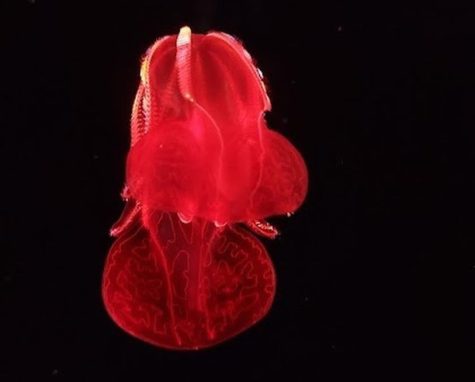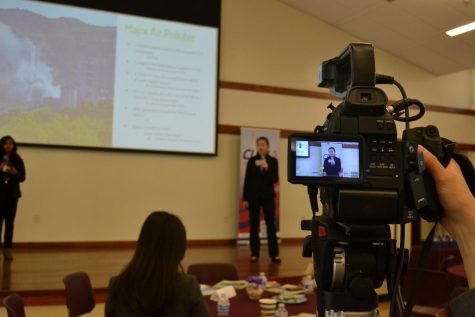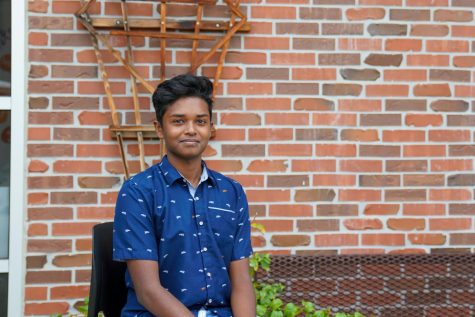You can study that?
Students and alumni share their opinions on stigmas around certain college majors
Salma Rezeik puts on makeup in a scene of Elhak’s film “Absentia,” where Elhak uses clip overlap to characterize the subject’s mind racing.
December 13, 2022
In the world of higher education, there are countless majors to choose from. Some students may choose a “traditional” major, while others may opt for a unique field of study. However, there are often stigmas surrounding certain college majors, with some people believing that some majors are not as valuable as others. In this article, students and alumni who have chosen unique college majors discuss their thoughts on the stigmas surrounding their fields of study.
Rokiya Elhak
While many students enjoy watching films with friends, senior Rokiya Elhak has always been more interested in producing them. Directing and acting with her friends, she’d create short films to encompass any project ideas she had at the time.
“I started [a] YouTube channel, and I really got into editing,” Elhak said. “When I found out there [were] film classes [at De Anza], that’s when I was like, ‘This is a real thing. [Film is something] I can actually study, not just [a] hobby.’”
Throughout high school, Elhak was set on majoring in film. During the college application process, however, she began to receive feedback that caused her to think about her decision more carefully.
“My dad kind of started freaking out that I actually wanted to do film,” Elhak said. “He basically [was] second guessing my whole career.”
Elhak has also faced criticism from others who believe that a film career is not financially viable. She thinks that this may be due to the STEM-heavy focus at MVHS.

“People say, ‘Oh, how [are] you going to make money? You’re just going to be broke. You’re not going to get a job,’” Elhak said. “This one guy basically called me stupid. [He said,] ‘Oh, yeah, you’re [a] film [major], I forgot. You’re probably stupid.”
Although she felt pressured about career stability and a financial future, Elhak stuck with her choice.
“At the end of the day, I’m happy with [film] because I know that’s what I want to do,” Elhak said. “It’s possible [that] it’s going to be harder to get a job in the film industry. I know that [it’s] unconventional, [but] I’m fine with that.”
Shaunak Joshi
Ever since he was little, senior Shaunak Joshi has enjoyed marine biology. From watching David Attenborough documentaries to researching different fish species, Joshi’s passion for marine life was prominent throughout his youth.

“As a kid, I used to love visiting the Monterey Bay Aquarium,” Joshi said. “I could probably identify [around] 30% [of the fish] and definitely all the sharks.”
So when the time to start thinking about college came around, Joshi was set on his choice of major — Marine/Aquatic Biology. However, when looking deeper into his major’s application process and career pathways of his major, he began to consider other options.
“I did consider [applying for] biology, microbiology, mostly because of the pay, but ultimately, I decided I’d rather be doing [marine biology] for somewhat less [pay] than other subjects for somewhat more[pay],” Joshi said.
Finalizing his major after starting the application process, Joshi’s friends and family were supportive throughout his journey. At MVHS, he felt many were interested in his decision, saying that “people generally think having a niche major is pretty cool.” But outside of school, Joshi recalls moments when people treated him differently because of his major.

“Once at work, I [talked] with my supervisor about what major I’d be going into, and he started the conversation all happy and stuff. [He said,] ‘Oh, [what] are you majoring in?’ I said, ‘Bio.’ [He said,] ‘Do you [want to] be a doctor?’ and I said, ‘No,’” Joshi said. “And then you could see [his] smile start to go away [and] get replaced by a grimace as I went on.”
Joshi thinks that criticisms may have to do with the lack of diversity in the community. He believes students can get a well-rounded view of the world if schools implement courses of different varieties, especially in non-STEM fields.
David Lu
Having had a passion for the environment since he was little, senior David Lu loved to take walks and spend time in his backyard. Once he reached high school, he decided to participate in an environmental protection summer program in Alaska.
“I went to Alaska with a group of students from [an outside organization] to study the effects of climate change on the environment,” Lu said. “It really opened my eyes to the urgent [need] for environmental protection [and] conservation.”
Lu was drawn to Environmental Engineering as a major because it combined science and technology with a focus on protecting the environment. He believes the field is ever-changing, “and there are [many] exciting opportunities for innovation and problem-solving.”

Despite his passion for the field, Lu has faced challenges because of his major choice.
“There are still a lot of people who don’t fully understand the [importance of] environmental protection, [and] they sometimes dismiss it as a ‘less practical’ or ‘unimportant’ field,” Lu said.
Lu believes that societal pressure and lack of support can make it difficult for some students to pursue their passions, especially if they are not in certain types of STEM fields.
“The community we live in indirectly puts pressure on students: if you don’t pursue STEM, you’re not gonna have a good life,” Lu said.
Lu also believes that some students may feel pressure to pursue a certain major because of their parents’ careers without fully considering their own interests and goals.
“In this community, many go into STEM only because their parents work in STEM,” Lu said. “How are we supposed to decide what to do? If it goes well, good for them, but if it doesn’t, it’s kind of too late. After four years, you’re stuck.”
Although he faced challenges, Lu’s passion for Environmental Engineering has not wavered and he remains determined to positively impact the environment, also encouraging others to follow their passions and not be limited by societal expectations.
Rachel Chen
When it came time to choose a major for college, MVHS ‘22 Alum Rachel Chen knew that she wanted to pursue nutritional science. However, she was aware of the stigmas that sometimes come with choosing a niche major.
“When I first decided to become a nutritional science major, I had considered the fact that some people might expressly say, ‘Oh, that’s just an easy major, that’s not that important,’” Chen said. “But as long as I, myself, believe that what I’m doing is important, and I enjoy doing it regardless of what others think, for me [that’s] alright.”
Despite the potential criticism, Chen decided to follow her passion and pursue nutritional science at UC Berkeley. She has found that, while some may not take her major seriously, she is surrounded by a supportive community of peers and professors who share her enthusiasm for the subject.
Chen also remembered encountering classmates in high school and college who dismissed non-STEM majors as less challenging or valuable than STEM fields. She believes this is a misguided and unfair perception, but unfortunately, is commonly heard when applying to college.
“People would be like, ‘Oh, well, [those students] are not smart’ simply because they don’t like STEM courses,” Chen said.

Chen believes that choosing a major should not be solely based on the potential income it can provide. While money is certainly an important factor in life, it should not be the only consideration when deciding on a career path.
“Money is definitely important in life, and if you don’t have enough money, then obviously you won’t be able to survive,” Chen said. “But at the same time, you should also take [into account] the idea of what [job] you truly want.”
However, for Chen, the most important factor in choosing a major is finding something that she is passionate about which brings her fulfillment. She is willing to sacrifice a higher salary in favor of a career she loves.
“I feel like just having a job that, even if it pays a little bit less than [other] jobs, as long as you enjoy it and don’t feel tired doing it, in the end, it’s worth it,” Chen said.


















